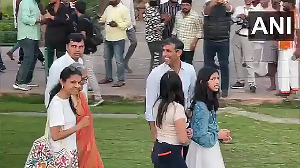The direction was given by designated TADA Judge P V Bavkar on a petition filed by Salem's lawyers alleging assault on Salem by police in jail.
However, the judge turned down the plea of Salem's lawyers to remand the gangster to judicial custody saying he would decide about it on October 29.
The court took on record the statement of Prosecutor Rohini Salian that Salem was subjected to medical tests on thursday and Friday and that his reports were normal except for the migraine which he has been suffering from for the last three years.
Salem's counsel moved a designated TADA court alleging that he was beaten up at Bhoiwada lock-up during interrogation on Friday night and demanded that the court record his statement.
Salem, remanded to police custody for a 1995 murder case of real estate developer Pradeep Jain, told his lawyers who met him early on Friday that he was beaten up during the night at the police station lock-up, defence lawyer Ashok Sarogi said.
The lawyers also demanded that police place Salem in judicial custody instead of police custody in view of alleged assault. They further demanded that Salem be sent for medical check up immediately.
Salem had on Thursday told the court that he apprehended torture by Mumbai Police and had sought the court's protection. Hearing his plea the court directed police not to subject him to third-degree methods during interrogation.






 © 2025
© 2025